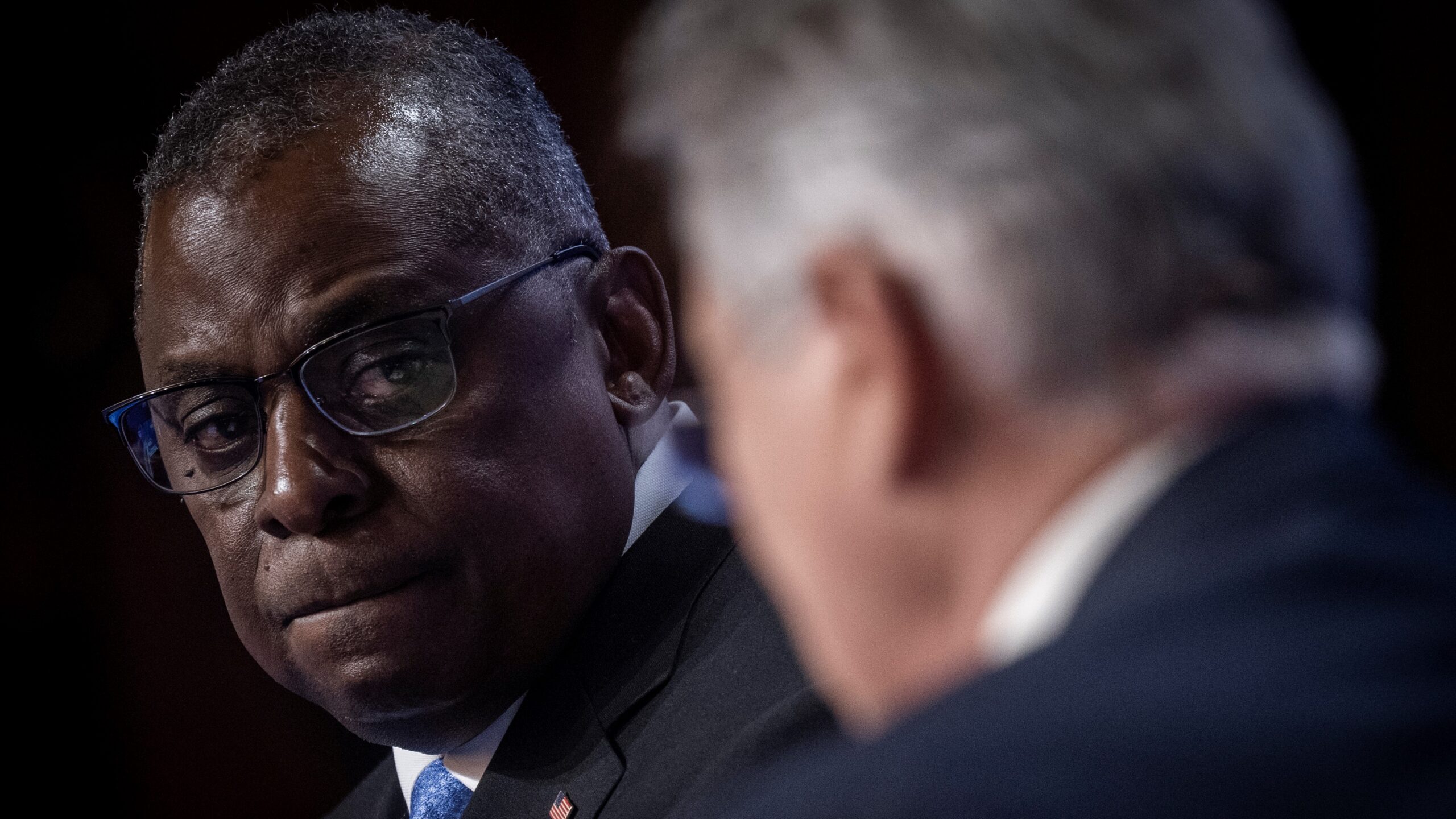
Secretary of Defense Lloyd J. Austin III and Dr. John Chipman, Director-General and Chief Executive, IISS, answer questions after Austin’s address to the Shangri-La Dialogue in Singapore, June 11, 2022. (DoD photo by Chad J. McNeeley)
SINGAPORE: In what was billed as a major policy speech, US Defense Secretary Lloyd Austin told hundreds of defense and civilian leaders from around the Indo-Pacific of the stakes of the persistent contest between supporters of the rules-based international order versus Russia and China.
Russian President Vladimir Putin’s “reckless war of choice has reminded us all of the dangers of undercutting an international order rooted in rules and respect,” he said. “Let’s use this moment to come together in common purpose. Let’s use this moment to strengthen the rules-based international order. And let’s use this moment to think about the future that we all want.”
The death and destruction sown by Putin’s forces across Ukraine raise “urgent questions for us all: Do rules matter? Does sovereignty matter? Does the system that we have built together matter? I am here because I believe that it does. And I am here because the rules-based international order matters just as much in the Indo-Pacific as it does in Europe.”
READ Breaking Defense’s coverage of the Shangri-La Dialogue
Of course, Putin has broken all those rules by invading Ukraine and in the manner in which his troops have murdered civilians and indiscriminately reduced non-military targets to rubble.
The breaking of those rules has dominated discussions here at the Shangri La Dialogue. Speaking here last night, Japanese Prime Minister Fumio Kishida made his country’s view clear: “Ukraine may be East Asia tomorrow.” Driven by that, Japan plans to double its defense spending over the next five years and will provide $2 billion in patrol boats and other maritime security assistance for Indo-Pacific countries, the prime minister said. He didn’t name the recipients, but it would presumably be targeted at the Pacific island states, who face off with Chinese coast guard and militia ships on a regular basis in their economic zones.
The US is taking similar actions. In a symbolic gesture, the brand new commandant of the Coast Guard, Adm. Linda Fagan, became the first of her position to attend the Shangri La Dialogue. Austin, more concretely, announced that the “first major US Coast Guard cutter (will be) permanently stationed” in Oceania-Pacific.
RELATED: US-China defense leaders discuss Russia, Taiwan and crisis communications
But the fundamental question here is, will China take Putin’s behavior as license to invade Taiwan?
Austin, who spoke with Chinese Defense Minister Gen. Wei Fenghe in some detail about Taiwan Friday, took pains to make America’s policy on Taiwan crystal clear in a way that one close observer of the scene described as “remarkable.” Austin’s recitation of US policy:
“We remain firmly committed to our longstanding one-China policy—guided by the Taiwan Relations Act, the three Joint Communiques, and the Six Assurances.
“We categorically oppose any unilateral changes to the status quo from either side.
“We do not support Taiwan independence.
“And we stand firmly behind the principle that cross-strait differences must be resolved by peaceful means.”
China, which has protested US arms sales to Taiwan, will not have liked his pledge to assist “Taiwan in maintaining a sufficient self-defense capability.”
The most interesting twist to Austin’s presentation was his claim that, while US policy toward Taiwan hasn’t changed, Beijing’s has.
“So our policy hasn’t changed. But unfortunately, that doesn’t seem to be true for the PRC… We’ve witnessed a steady increase in provocative and destabilizing military activity near Taiwan. That includes PLA aircraft flying near Taiwan in record numbers in recent months—and on a nearly daily basis.
“We remain focused on maintaining peace, stability, and the status quo across the Taiwan Strait. But the PRC’s moves threaten to undermine security, and stability, and prosperity in the Indo-Pacific. That’s crucial for this region, and it’s crucial for the wider world,” Austin said.
In the last few days, some Chinese have criticized Japan for trying to help create an Asian NATO because it declared it will seek closer relations with the alliance. Japan has especially worried about the People’s Republic of China’s intentions regarding Taiwan, which sits uncomfortably close to Japanese islands.
China has long regarded the prospect of a regional multilateral alliance with great trepidation. Austin tackled the issue headlong.
“Let me be clear. We do not seek confrontation or conflict. And we do not seek a new Cold War, an Asian NATO, or a region split into hostile blocs. We’ll defend our interests without flinching.” The US, he said, seeks a region marked by ”expanding security, not one of growing division.”
Lest there be any confusion on the part of China or other countries in the region, Austin said “the Indo-Pacific is our center of strategic gravity.” He said it’s going to be “central” to the Biden Administration’s forthcoming National Security Strategy “and to my Department’s National Defense Strategy.”
The defense secretary criticized China for what he called an “alarming increase” in “unsafe aerial intercepts and confrontations at sea by PLA aircraft” and ships. He mentioned the recent lasing of an Australian P-8, which endangered the crew. He also cited PLA fighters responsible for a “series of dangerous intercepts of allied aircraft operating lawfully in the East China and South China Seas. That should worry us all.”
Clearly intending to both signal China and US allies and partners in the region, Austin made an unusual reference in a policy address to new weapons.
He said the US is “on the cusp of delivering prototypes for high-energy lasers that can counter missiles. And we’re developing integrated sensors that operate at the intersection of cyber, EW, and radar communications.” Now, close observers of the military know that digital radars have made the possible for years. Many of the F-35’s most potent capabilities, for example, derive from its mingling of offensive cyber and EW, as well as its ability to fuse threat data.
At the end of Austin’s speech, an assistant professor at Tokyo International University, Jeffrey Ordaniel, asked him about the fake islands China built by destroying some of the South China Sea’s most pristine coral reefs.
“When China started building artificial islands in the South China Sea, the United States said there would be consequences,” Ordaniel said. “China completed those artificial islands. The United States also said that there will be consequences if China militarized those islands. China militarized those islands anyway, stationing bombers and fighter jets. So I guess many of us here are curious, what will be different in the Biden administration’s approach to the South China Sea? Because it seems that the current policy is not working or at least not changing the behavior of China.”
Austin’s answer may have been more revealing than he’d like as he struggled to offer on specifics. He said, “We’ve seen allies and partners grow closer together and work together in a more deliberate way to make sure that they have the ability to protect their interest and our territorial borders.” He added that “like-minded countries bond together to to create new capabilities,” which may have been a reference to the AUKUS agreement and the decision of Australia to buy nuclear attack submarines and the three countries to cooperate on advanced technologies like hypersonics, cyber and quantum.
Austin ended with this somewhat rambling conclusion: “So the effect has been that, that it’s had an effect, that there are some consequences, and those consequences are a much more united region and a region that has focused ever so much more on a vision of a free and open Indo-Pacific, so I think I think there have been consequences.”
The inevitable question is, do China and the other countries in the region think there have been consequences?






















